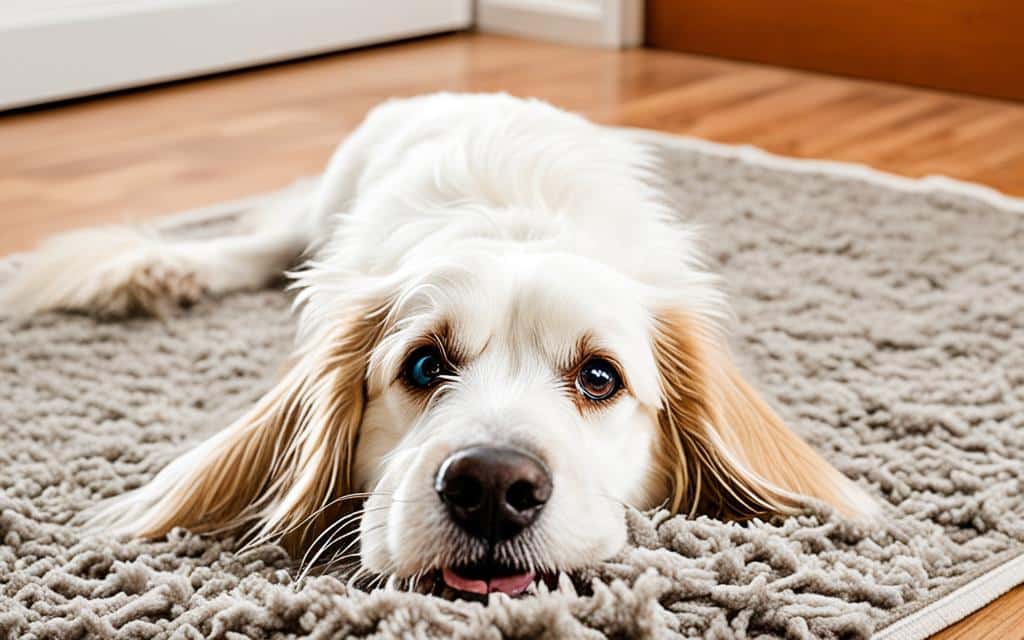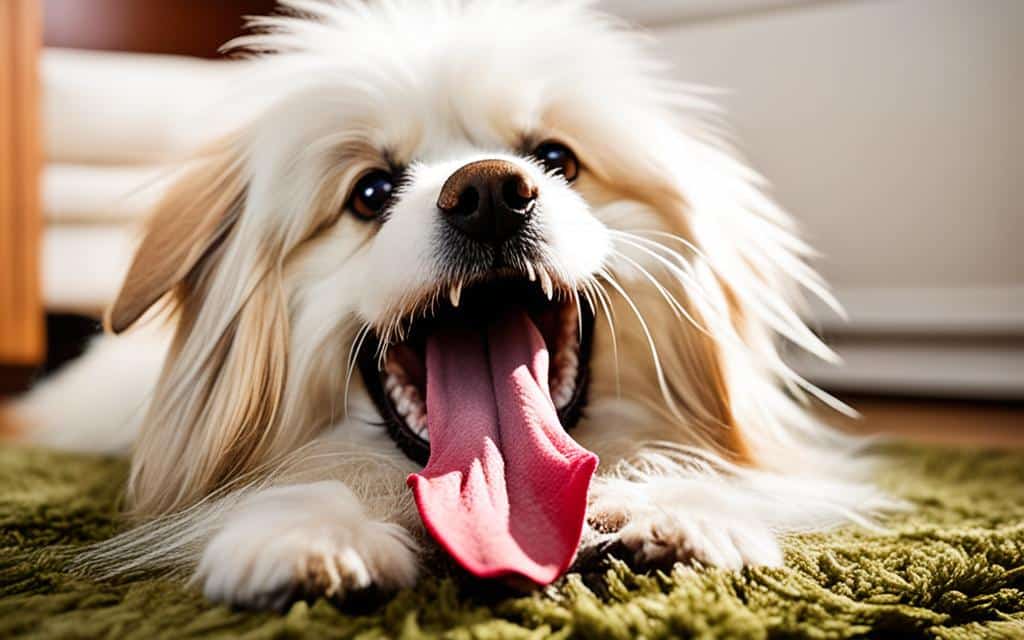Have you ever wondered why your dog obsessively licks your favorite rug? Is it a strange habit or a sign of something more?
Dogs licking rugs can be a curious and concerning behavior. While licking is a normal part of a dog’s self-grooming instinct, excessive licking of rugs may indicate underlying issues such as boredom, anxiety, stress, or even a medical condition. Some dogs may lick rugs out of boredom, lacking mental and physical stimulation. Others may lick rugs as a way to cope with anxiety or stress. Additionally, excessive rug licking can be a symptom of canine obsessive-compulsive disorder (OCD) or health issues such as gastrointestinal problems. Understanding the reasons behind this behavior is essential to address it effectively and ensure the well-being of your dog.
Key Takeaways:
- Excessive rug licking in dogs may indicate boredom, anxiety, stress, or potential health issues.
- Providing mental and physical stimulation can help prevent dogs from licking rugs out of boredom.
- Identifying and addressing triggers for anxiety or stress can help alleviate rug licking behavior.
- Consulting with a veterinarian is important to rule out medical causes and provide appropriate treatment options.
- Creating an environment that discourages rug licking and providing alternative outlets can help manage the behavior.
Reasons Dogs Lick Rugs and How to Address the Behavior
There are various reasons why dogs may lick rugs and several strategies to address this behavior. Dogs may lick rugs out of boredom, so providing them with toys, games, and treats to keep them mentally and physically engaged can help prevent excessive rug licking. By offering alternative activities, you can redirect their attention and discourage rug licking.
If the licking is related to anxiety or stress, it is essential to identify and address the triggers causing these emotions. Increasing exercise, providing mental stimulation, and incorporating socialization activities into your dog’s routine can help alleviate stress and provide an outlet for their anxious energy. Keeping your dog’s mind and body engaged can reduce the likelihood of them turning to rug licking as a coping mechanism.
In some cases, rug licking may be a sign of canine obsessive-compulsive disorder (OCD). If you suspect this, consulting with a veterinarian is crucial. They can provide guidance on possible treatments, such as anti-anxiety medication and behavior modification therapy, to manage the OCD and reduce rug licking tendencies.
It’s also important to consider any underlying health issues that may be causing the excessive licking. Gastrointestinal problems or canine cognitive dysfunction can contribute to this behavior. By consulting with a veterinarian, you can rule out medical causes, address any health concerns, and explore appropriate treatment options for your dog’s overall well-being.

In summary, understanding the reasons behind your dog’s rug licking behavior is the key to effectively addressing it. By providing mental and physical stimulation, identifying and managing triggers, and seeking professional guidance when necessary, you can prevent excessive licking and ensure your dog’s optimal health and happiness.
Tips for Preventing and Managing Rug Licking Behavior
To prevent and manage rug licking behavior, it is important to create an environment that discourages the behavior and provides alternatives. Keeping rugs clean and free from enticing smells or tastes can help reduce a dog’s urge to lick them. Dogs are naturally attracted to scents, so using pet-safe deterrent sprays or citrus-scented cleaners on the rugs can discourage them from licking. Additionally, providing appropriate chew toys, interactive puzzles, and mental enrichment activities can redirect a dog’s attention and prevent them from turning to rug licking. These toys and activities not only offer a distraction but also engage their minds and help fulfill their natural chewing instincts.
Consistent training and reinforcement of obedience cues, such as using the “leave it” command, can also be effective in managing rug licking behavior. By teaching dogs alternative behaviors and redirecting their focus, they can learn that licking the rug is not desirable. It is important to be patient and consistent during the training process, rewarding them when they display the desired behavior. Positive reinforcement techniques, such as verbal praise and treats, can help reinforce the training and encourage dogs to choose other activities over rug licking.
Regular veterinary check-ups play a crucial role in managing rug licking behavior. A veterinarian can conduct a thorough examination to identify any underlying health issues that may contribute to the behavior. Gastrointestinal problems, dental issues, allergies, or even anxiety disorders can all manifest with excessive licking. Addressing these underlying causes is essential for effectively managing and preventing rug licking. Your veterinarian may recommend specific treatments, diets, or medications based on their findings, ensuring your dog’s overall health and well-being.
In conclusion, preventing and managing rug licking behavior requires a multi-faceted approach. Creating a tempting-free environment, providing stimulating alternatives, consistent training, and regular veterinary care are all important components. By addressing the root causes and providing appropriate outlets for mental and physical stimulation, you can effectively manage and prevent dogs from engaging in rug licking behavior, promoting a happy and healthy life for your canine companion.
FAQ
Why do dogs lick rugs?
Dogs may lick rugs for a variety of reasons, including boredom, anxiety, stress, or medical conditions.
What are the reasons behind excessive rug licking?
Excessive rug licking can indicate underlying issues such as boredom, anxiety, stress, canine obsessive-compulsive disorder (OCD), or health problems.
How can I stop my dog from licking rugs?
To stop your dog from licking rugs, you can provide mental and physical stimulation, address anxiety or stress triggers, consult with a veterinarian for possible treatments, and create an environment that discourages the behavior.
What can I do to prevent rug licking behavior?
To prevent rug licking behavior, you can keep rugs clean and free from enticing smells, provide appropriate chew toys and mental enrichment activities, train obedience cues, and ensure regular veterinary check-ups.
Is rug licking ever a sign of a health issue?
Yes, rug licking can be a symptom of underlying health issues such as gastrointestinal problems or canine cognitive dysfunction. Consulting with a veterinarian can help identify and treat these conditions.

